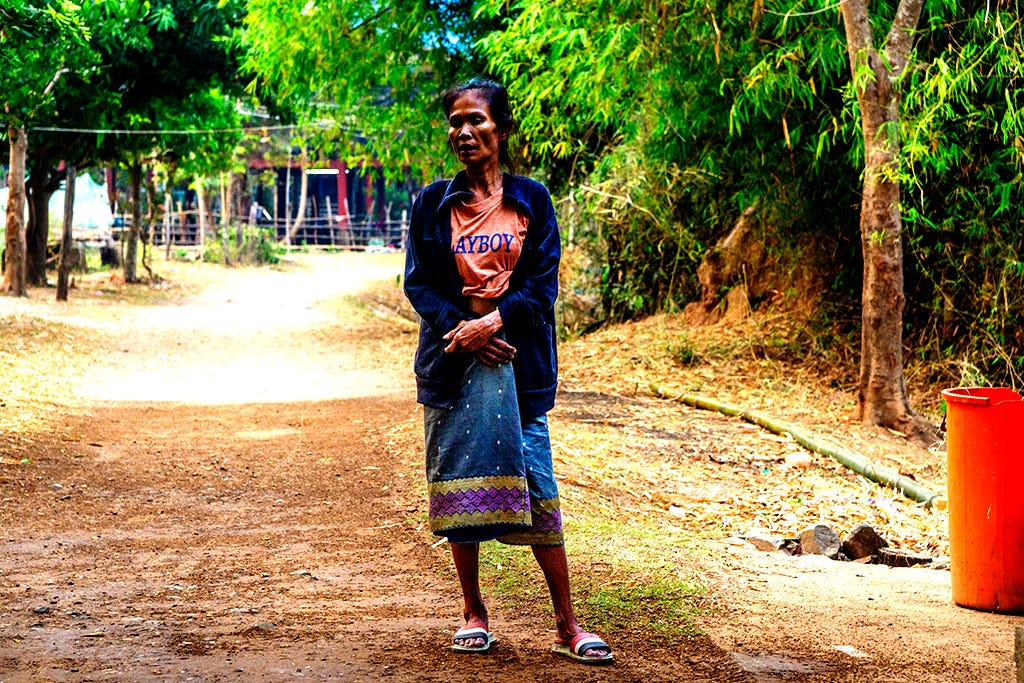[Don Det, 3/28/23]
In Phnom Penh last month, I would write at a very crude drink and food stand, with its clientele mostly tuk-tuk drivers, van drivers and porters. The food was at the lower end, with chicken feet, pig innards, pig tongues or even dogmeat served. When this food stand’s owner said he was going to take his dad to Da Nang for a vacation, I was a bit surprised, since his income couldn’t have been that much.
Later, I talked to the old man himself, to find out it was actually an Australia-based daughter who will treat the family to this vacation. She also sends money home regularly.
Without necessarily meaning to deceive, people don’t tell you everything, so you may find out, gradually or suddenly, that your easy date is actually of the wrong sex, or your perfect spouse is gay, which, to be politically correct, doesn’t make him or her any less perfect. After an 80-year marriage that has produced many loving children, grandchildren and great grandchildren, you may discover that none of them shares your DNA.
With each day in Don Det, I find out something new. Though I’ve mentioned a man who spent two years in Thailand, I didn’t know how common it was for Don Det residents to go there, nearly always illegally, to earn money. His wife spent seven years in Thailand.
“They go there one year, two year, come back two, three month, then go back to Thailand for one, two year.”
Pointing to a nearby house, he added, “They go there five year. They make enough money to build how. How, very important. If you have money but no how, people don’t believe you.”
This man also spent 17 years in Vientiane, so he did try hard to leave Don Det. Now, he’s happily back home. Most people do return, he told me.
I’ve described his business, Green Bamboo, which consists of a tiny store, tiny eatery and four rooms for rent. Only today, I found out he also sells snacks and drinks at a beach half a mile from Green Bamboo.
A while back, he even taught English. Charging each student 100,000 kips, or just under $6, a month, he held classes five nights a week.
“First month, maybe 20 student. Second month, 13, 14 student. Third month, eight student,” he laughed.
“It’s too difficult for some…”
“Study not important. They mud make money.”
As we talked, his wife tossed food to the chickens. She wore a Mickey Mouse T-shirt. The egg sandwich she had served me came with a soft, stale roll listed as “baguette” on the menu. On another day, the bread was much better.
Just outside the railing were twelve tomato plants in sacks. “Hey,” I asked, “how come you don’t plant more? You know, have maybe 30 tomato plants?”
“I do too mud work,” he shrugged.
As a guy who has never planted anything, I shouldn’t be harassing this farmer, but I pestered him some more. Pointing to a large patch of dirt, I asked, “How come you don’t plant something there?”
“I did, long bean.”
“String beans.”
I’ve also taught him “murder” and “kidnap.” My sibilants at the end of words, he ignores. He prefers how to house.
When borders were closed during Covid, there weren’t just no tourists here, but no sneaking into Thailand to work, but Don Det survived. With a population of 400, it has roughly 10 crack heads who get by on odd jobs. No one starves or begs.
In Thailand, there are Laotian, Cambodian and Burmese immigrants. To earn more, Thais go to Malaysia, Singapore, South Korea and, well, many more countries across the globe.
From a North Macedonian friend, I learnt there are now Nepalese and Bangladeshi immigrants in that Balkan nation. They’re allowed in to fill a labor shortage caused by North Macedonians leaving to work in Germany, France and Greece, etc.
Once inside Europe, many of these South Asians will try to enter Germany and France, too, if not the UK. All the horrible news from those places don’t deter them.
With war and economic collapse, we can expect even more immigration, mostly illegal and chaotic. Americans, too, will flee.
Don Det has about 20 white residents, including Adam, the owner of a bar featured in Forbes. From Brighton, he came to Laos 13 years ago.
There’s a German who owns Torture Sandwich Bar. He makes sausages and imports excellent cheeses.
Ten yards from my room is Datta Banana Leaf, a restaurant owned by a Sri Lankan and his Lao wife. Checking it out today, I was served by three teenaged girls who, after delivering my mie goreng and iced tea, promptly went to lie down, their bodies touching, to stare at cellphones. One girl was under the low table.
In a land where smiles come easy, the Sri Lankan was mostly scowling, but maybe he just had a bad day. A Catholic, he had a shrine to Saint Anthony. From a glass rose a thicket of red incense sticks, an Oriental touch added by his wife, undoubtedly.
Scorned by people, Saint Anthony preached to fish. Decades after his death, his tongue was still fresh, not that it mattered to Saint Anthony.
To be uprooted is painful to many, liberating to others, but that sense of freedom can’t last.
Friendlier, the Sri Lankan’s wife invited me to go to the market around 6AM tomorrow, on her boat. I can’t wait.
With our fears and delights, we remain children until the end, though sadness accrues, until indifference releases us.
Working on this earlier, I had to stop because my laptop screen was covered by mayflies. Rain was coming. Turning off my computer, I figured they would fly away, but they all clung to this source of light, even as it went dark. Thus, they died.
[Don Det, 3/30/23]
[Don Det, 3/29/23]
[Don Det, 3/30/23]
[Don Det, 3/30/23]








Your experience in trying to help the man teaching English with his pronunciation is not so surprising. Over the years, I have noticed a few things that might explain why certain difficulties with pronunciation by non-native speakers are so common. Some people have a talent for mimicry, others don't. Closely related, some can pick up alien pronunciations just by being around them for awhile, others can't.
Less obvious are two other issues. The first is that many learners, once they acquire the ability to be understood, no longer see the need to put more effort into cleaning up the niceties of precise pronunciation. I think this is an eminently practical approach, depending on what one's ultimate ambition for using the language is.
In your own case, I noticed the man you were helping was dropping some of the 's' sounds. It might be that his native tongue does not have plurals and hence he does not always recognize when the 's' is needed. I noticed this when I was learning Mandarin--singular and plural are the same word. And my wife, a native Mandarin speaker, still often leaves the 's' off her plurals, even after decades of living with me in an English-speaking country. Nevertheless, my hat is off to anyone who can communicate well in any language besides their own native tongue, and it is even more impressive to be able to live in a society surrounded by people who don't speak your native tongue.
Your laptop picture is funny! I had a similar experience years ago when I lived near a low-lying area in southern Maryland that had lots of mosquitos. A friend from the office who had once worked at a power plant on the South Texas gulf coast told me it was much worse down there, and had some funny "mosquito stories'. He said that if you put some incense or a citronella candle on the table near your work, often it would discourage them. It was winter when he dropped this tidbit one day, so I never got a chance to try this before leaving the area. He also told me that a lot of people had "foggers" and would go outside and fog their yards with insecticide to chase them away. I asked him how that would do any good since it seemed to me they would come back as soon as you put the fogger away, and he said that once you pushed them back beyond a certain radius, you would be "out of their range" since they only traveled a short distance. Who knew?
"Sadness accrues until indifference releases us . " Absolutely true . Dostoyevsky and Sartre would agree ?